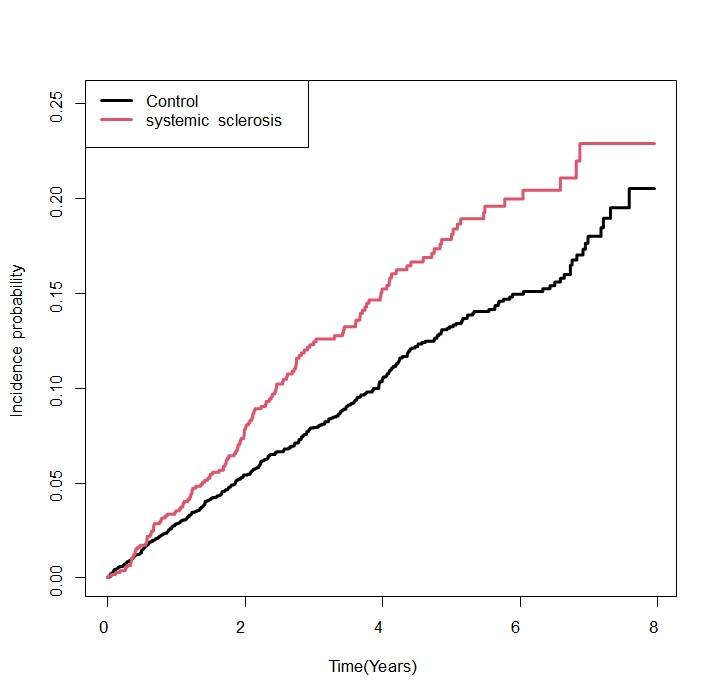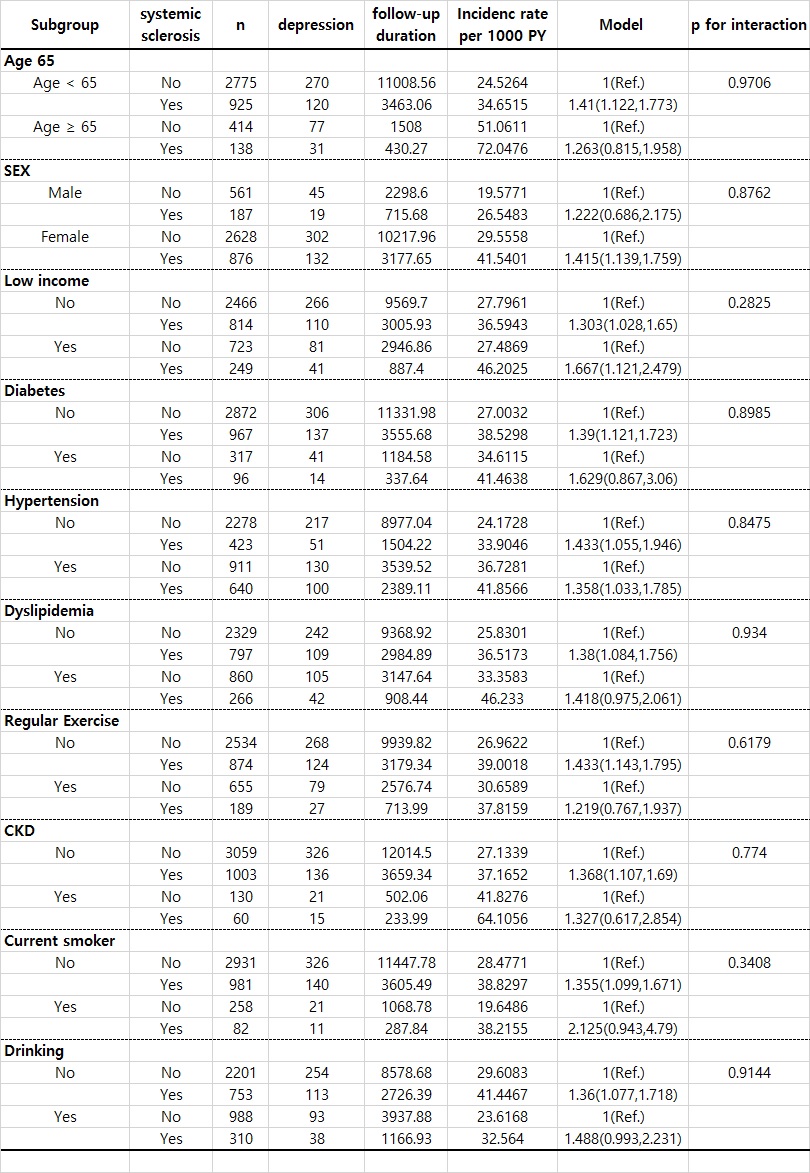Session Information
Date: Sunday, November 12, 2023
Title: (0609–0672) Systemic Sclerosis & Related Disorders – Clinical Poster I: Research
Session Type: Poster Session A
Session Time: 9:00AM-11:00AM
Background/Purpose: Systemic sclerosis (SSc) is a rare chronic inflammatory disease characterized by vasculopathy, autoimmunity and progressive fibrosis in various organs. The patients with SSc are suffered from dyspnea, cough, and gradual skin and joint contracture, resulting in significant physical and psychological burden. Psychological symptoms in SSc patients include pain, depression, and concerns about appearance disfigurement. Previous studies have reported that depression is common in SSc patients, ranging from 36% to 65%. However, no study has unveiled the risk of new-onset depression in SSc patients.
The present study was conducted to determine whether SSc is an indeed risk factor for the development of new-onset depression. To determine whether the incidence rate (IR) of new- onset depression in SSc patients is higher than in normal subjects, we used data from a nationwide health care database.
Methods: We selected subjects from National Health Insurance System database who were diagnosed with SSc between 2010 and 2016. Subjects who did not get a general health checkup in the previous 2 years, who were diagnosed with depression before their SSc diagnosis, who were less than 20 years old, or who had missing data were excluded. To minimize the possibility of reverse causality, an analysis with a 1-year lag was performed. Kaplan-Meier analysis was conducted to assess the incidence of new-onset depression, and Cox proportional hazards regression was used to calculate adjusted and unadjusted hazard ratio (HR) and 95% CIs. HR for new-onset depression was adjusted for age, sex, smoking, drinking, physical activity, body mass index (BMI), income, diabetes, hypertension, and dyslipidemia.
Results: A total of 1,063 SSc patients (female 82.4 %) and 3,189 age-, sex-matched non-SSc controls with mean (SD) age of 53.1 (10.6) years were included in the analysis. During follow-up periods after 1 year of lag time, the cumulative incidence of new-onset depression was significantly higher in patients with SSc vs controls (38.7 vs. 27.7 IR per 1000 person-years). After adjusting for covariates (age, sex, smoking, drinking, physical activity, BMI, income, diabetes, hypertension, and dyslipidemia), the presence of SSc was associated with 38.1 % increased risk of new-onset depression (HR 1.381; 95% CI, 1.128-1.691), compared with controls. SSc disease itself was determined as an independent risk factor for new-onset depression in subjects with younger age (age < 65 years; HR 1.41; 95% CI 1.122-1.773), female gender (HR 1.415; 95% CI 1.139-1.759), and absence of regular exercise (HR 1.433; 95% CI 1.143-1.795), after adjusting for covariates. Interestingly, the risk of new-onset depression after SSc diagnosis was found to be relatively higher in the low-income group (HR 1.667; 95% CI 1.121-2.479 vs HR 1.303; 95% CI 1.028-1.650).
Conclusion: The present study suggests that the SSc diagnosis is associated with a significantly increased cumulative incidence and risk of new-onset depression. This association is more pronounced in female gender, younger age group, and those who do not exercise regularly. Regular assessment of the occurrence of depressive symptoms should be more emphasized in the patients with SSc after diagnosis.
To cite this abstract in AMA style:
Son H, Moon S. Risk of New-onset Depression in Patients with Systemic Sclerosis : A Nationwide Population-based Study [abstract]. Arthritis Rheumatol. 2023; 75 (suppl 9). https://acrabstracts.org/abstract/risk-of-new-onset-depression-in-patients-with-systemic-sclerosis-a-nationwide-population-based-study/. Accessed .« Back to ACR Convergence 2023
ACR Meeting Abstracts - https://acrabstracts.org/abstract/risk-of-new-onset-depression-in-patients-with-systemic-sclerosis-a-nationwide-population-based-study/


